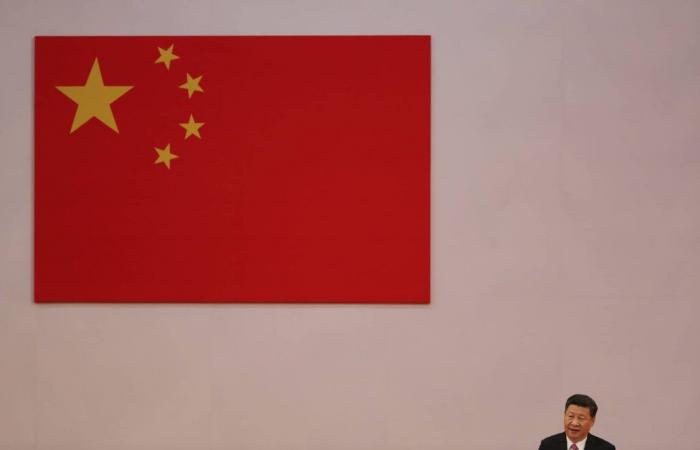Interview
December 17, 2024
Since the end of the Cold War, China has continued to develop its economy, its army and its diplomatic apparatus, to the point of becoming the second world power. The 2020 decade, however, marks an inflection point in Chinese dynamism. The after-effects of Covid-19 are still impacting the economy, tensions with the US rival are intensifying, and social cohesion remains fragile. Could this slowdown in Chinese development have consequences for the regime? What direction is the China/United States confrontation taking with my re-election of Donald Trump? What place does China occupy in the international sphere? The analysis of Emmanuel Lincot, sinologist, researcher associated with IRIS and professor at the Catholic Institute of Paris. It publishes in February 2025 “Asia is a land of conflict. Investigation into the new global powder keg »co-written with Barthélémy Courmont.
China is facing economic difficulties: sluggish growth, deflation, youth unemployment. To what extent is the popularity of the regime called into question?
The regime has not yet been called into question, but the social fabric is very damaged. The first reason being the Covid-19 crisis, its consequences, and a sudden deceleration of the economy with the symptoms that you describe: an unprecedented rise in unemployment among young people, an unfavorable situation exerted by American and European pressures, without forget an anxiety-provoking climate for those in power which results in unprecedented purges within the army in particular, the feeling of not having the right strategic choices, whether in relation to the fall of the regime of Bashar Al-Assad in Syria or how Beijing sees the Pyongyang regime moving closer to Moscow, undoubtedly at the expense of its own interests. Added to this is a very serious moral crisis which was characterized by murders or acts of violence described by the national press as isolated cases: mass car killings leading to the death of at least 35 people on last month in Zhuhai, stabbing attacks on a Japanese high school student in Shenzhen in September and American academics also stabbed in Shengyang a few weeks earlier… There is in reality a deep malaise in this society. It is not harmonious as the regime tends to present it, referring to a Confucian ideology. On the contrary, it is profoundly disharmonious, extremely unequal and brutalized; phenomenon which, after all, is already very old. If we study the evolution of this society over the long term, we see that it has only experienced a succession of crises over the past two centuries. In short, since the opium wars and the unequal treaties through the Japanese occupation and the civil war, then the Maoist purges and the industrial revolution, China has experienced the worst.
You will reply to me that a society like ours will hardly have been spared either, but with one difference, and it is significant: each generation has begun the work of memory while trying to reconcile, not without success in elsewhere, with its neighbors. Is this the case for China? The answer is no. In short, China and its society are reaching a critical point: how can we know where we are going if we do not know where we come from? Because that’s China’s problem. She no longer has any bearings and remains extremely vulnerable on a psychological level. Do parents talk to their children about Tiananmen (1989) and the student massacres? Do grandparents talk about the Cultural Revolution (1966-76)? No. In this way, transgenerational disorders are unconsciously transmitted to which the most vulnerable succumb. The work Red ghosts by Tania Branigan shows us the full harmful extent of the phenomenon. And this pent-up anger, these anxieties and frustrations could one day be turned against the regime.
While Donald Trump’s return to power suggests a continuation of the rivalry between Washington and Beijing, to what extent can the Chinese economic slowdown be detrimental to the country in the context of this confrontation, particularly concerning Taiwan?
Two scenarios are possible. One, improbable, sees the regime giving thanks, renouncing its policy of rapprochement with Russia. Sanctions are then lifted quickly. But this is once again improbable, short of a palace revolution and the subsequent disappearance of Xi Jinping, quite simply because the United States has mourned the normalization of its relations with China. . Hatred of China is a consensus in America and Washington needs enemies. The economic war will therefore intensify with the certainty that now is the time or never to bring the adversary to its knees. Afterwards, technological distancing will be such that it will be too late. The second scenario sees the Chinese regime taken by the throat like the Japanese at the end of the 1930s and going to war against Taiwan. The United States and Japan react: the war becomes global. We can think that the Trump administration will favor the first scenario and in any case, slow down the deadline for the second. For the Chinese, it is the entry into a new era. The train of reforms is not going to slow down overnight, but it is clear that we are now turning our backs on a period already perceived over the years as a golden age, that of double-digit growth, of overconsumption and the belief, despite everything, in a better tomorrow. In Taiwan, there is cautious optimism, but the most pessimistic say that the sacrifice of the Ukrainians will only have postponed by a few years an inevitable deadline, that is to say a war against the island. In short, many say they are on reprieve, including with regard to the American ally, because once the manufacturing of microprocessors has been relocated outside Taiwan or other American and European competitors have asserted themselves, the island will have lost its main asset, in other words, its life insurance.
For several years, China seems to have presented itself as a mediating power (sponsoring normalization between Saudi Arabia and Iran, proposing a peace plan for Ukraine, etc.). To what extent is it active in resolving the major conflicts that are shaking the world today?
She is acting as a bluff. Of course, we can only welcome an easing of the conflict between Iranians and Saudis in Yemen. The West having no or few relations with Iran and Russia as an oil power that could be accused of a conflict of interests, China exercised a mediating role that only it could exercise between these two rival countries. But nothing prevents us from thinking that with the fall of the Syrian regime, this Arab-Iranian rivalry will not start again by moving towards the Middle East where China supports Palestine and refuses to consider Hamas. like a terrorist group.
As for Ukraine, the most concrete Chinese proposal is limited to a ban on the use of nuclear strikes. In short, nothing serious, nothing constructive. China’s initiatives lack credibility and its rhetoric of positioning itself as spokesperson for the “global South” actually has little substance.






